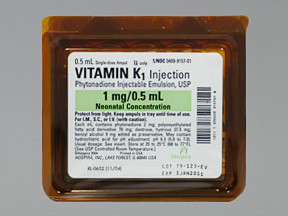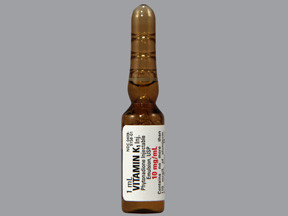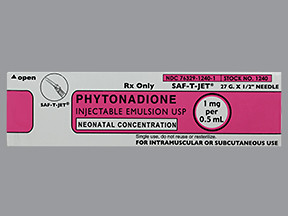VITAMIN K - INJECTION
PHONETIC PRONUNCIATION:
COMMON BRAND NAME(S): Aqua-Mephyton, Vitamin K
GENERIC NAME(S): phytonadione (vit K1)
Uses
USES: Vitamin K is used to treat and prevent low levels of certain substances (blood clotting factors) that your body naturally produces. These substances help your blood to thicken and stop bleeding normally (e.g., after an accidental cut or injury). Low levels of blood clotting factors increase the risk for unusual bleeding. Low levels may be caused by certain medications (e.g., warfarin) or medical conditions (e.g., obstructive jaundice). Vitamin K helps to treat and prevent unusual bleeding by increasing the body's production of blood clotting factors.
How to use VITAMIN K - INJECTION
HOW TO USE: This medication is given by injection under the skin or into a muscle or vein as directed by your doctor. If this medication is given into a vein, it should be injected very slowly (no more than 1 milligram per minute) to reduce the risk of serious side effects. (See also Warning section.) Dosage is based on your medical condition and response to treatment. If you are giving this medication to yourself at home, learn all preparation and usage instructions from your health care professional. The solution is normally clear and yellow in color. Before using, check this product visually for particles or discoloration. If either is present, do not use the liquid. Learn how to store and discard medical supplies safely. If you are using a certain "blood thinner" drug (warfarin), vitamin K can decrease the effects of warfarin for up to 2 weeks. Therefore, be sure to take your vitamin K and warfarin exactly as directed by your doctor or pharmacist. If you develop easy bruising or bleeding, seek immediate medical attention. You may need another dose of vitamin K.
Side Effects
Precautions
Interactions
Overdose
Images
Reviews
Faq for VITAMIN K - INJECTION
- Vitamin K injection is used to prevent or treat bleeding disorders in people who have a deficiency or are unable to absorb vitamin K.
- Vitamin K injection is administered by healthcare professionals through an intravenous (IV) or intramuscular (IM) injection.
- Common side effects of Vitamin K injection include pain or swelling at the injection site, nausea, flushing, and rapid heartbeat. Rare but serious side effects may include allergic reactions or anaphylaxis.
- The effect of Vitamin K injection lasts for a variable duration depending on the individual's condition and the dose administered. It is best to consult a healthcare professional for specific duration information.
- No, Vitamin K injection is not intended for oral consumption. It is typically administered via injection due to its rapid and direct absorption into the bloodstream.
- Vitamin K injection is generally considered safe during pregnancy and is often given to infants shortly after birth to prevent a rare bleeding disorder called vitamin K deficiency bleeding.
- Yes, Vitamin K injection may interact with certain medications such as anticoagulants (blood thinners) or antibiotics. It is crucial to inform your healthcare provider about all the medications you are taking to avoid potential interactions.
- Yes, Vitamin K injection requires a prescription from a healthcare professional.
- Yes, Vitamin K can also be obtained through diet by consuming green leafy vegetables, broccoli, Brussels sprouts, and vegetable oils. However, in cases of severe deficiency, oral supplementation or injection may be necessary.
Warning
WARNING: The injectable form of vitamin K can rarely cause severe (sometimes fatal) allergic reactions when given by injection into a muscle or vein. Therefore, vitamin K should be injected into a muscle or vein only when it cannot be given by injection under the skin or taken by mouth, or when your doctor has judged that the benefit is greater than the risk. Seek immediate medical attention if you experience symptoms of an allergic reaction such as rash, itching, swelling, dizziness, or trouble breathing.
Disclaimer
IMPORTANT: HOW TO USE THIS INFORMATION: This is a summary and does NOT have all possible information about this product. This information does not assure that this product is safe, effective, or appropriate for you. This information is not individual medical advice and does not substitute for the advice of your health care professional. Always ask your health care professional for complete information about this product and your specific health needs.




No Reviews Yet